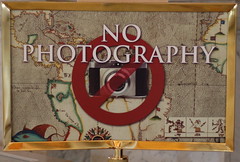By now you've seen the Fox 5 report on the harassment of photographers at Union Station. The video tells the story perfectly: Two mouthpieces representing Union Station--an Amtrak spokesman and a contracted security guard--at complete odds with one another. The video spread around the Internet, inspiring blog posts and further news reports, chronicling in a perfect 5 minutes an issue that has long plagued one of the city's most beautiful and most visited landmarks. But now what?
D.C. Delegate Eleanor Holmes Norton, a Democrat, has become an ally of photographers. She's railed against the incident Fox 5 caught on tape, and she's sent letters to photographers who wrote to her asking for help. She has indicated that she will hold hearings and possibly sue the management company that has dared to call Union Station private property. Photographers around the country are watching, because she has the power to propel a national conversation about photographers' rights. But she is only one person, and she is a very busy one. And though she is mighty, she does not have a vote in Congress.
Please contact your representatives. From Congress down to city hall, elected officials need to know that photography is not a crime. If you have been harassed, if you have been detained, you need to speak out. If it happens to you, it will happen to someone else.
I've begun this project to document locations around Washington, D.C., where photography has been prohibited or where photographers have been harassed. Some of these bans are honestly intended for security reasons. Some have been codified by court rulings. But the vast majority of these bans are instituted by agencies, offices or companies that have decided upon a very loose interpretation of the First Amendment.
The Web is a great resource for finding data on photographers' rights. I've added one of the most important, the Krages document, to the right, and I'll be adding more in the coming days.
If you've been stopped from taking a photograph in Washington, let me know. Chances are someone else has, too, and it is through sharing our stories that we can begin to tear down these ridiculous restrictions on tourists and artists.
Wednesday, June 11, 2008
Subscribe to:
Posts (Atom)
